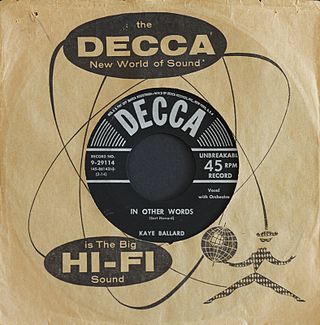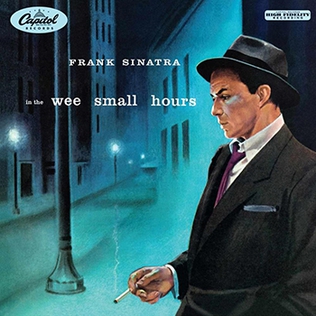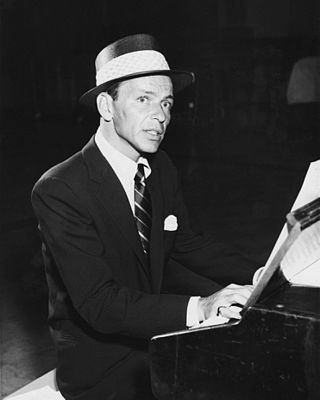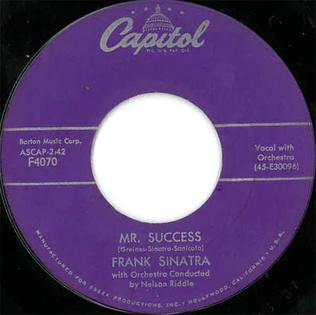
Harry "Sweets" Edison was an American jazz trumpeter and a member of the Count Basie Orchestra. His most important contribution was as a Hollywood studio musician, whose muted trumpet can be heard backing singers, most notably Frank Sinatra.

Nelson Smock Riddle Jr. was an American arranger, composer, bandleader and orchestrator whose career stretched from the late 1940s to the mid-1980s. He worked with many vocalists at Capitol Records, including Frank Sinatra, Ella Fitzgerald, Nat King Cole, Judy Garland, Dean Martin, Peggy Lee, Johnny Mathis, Rosemary Clooney and Keely Smith. He scored and arranged music for many films and television shows, earning an Academy Award and three Grammy Awards. He found commercial and critical success with a new generation in the 1980s, in a trio of Platinum albums with Linda Ronstadt.

"Fly Me to the Moon", originally titled "In Other Words", is a song written in 1954 by Bart Howard. The first recording of the song was made in 1954 by Kaye Ballard. Frank Sinatra's 1964 version was closely associated with the Apollo missions to the Moon.

In the Wee Small Hours is the ninth studio album by Frank Sinatra. It was released in April 1955 by Capitol and produced by Voyle Gilmore with arrangements by Nelson Riddle. The album's songs deal with themes such as introspection, melancholy, lost love, failed relationships, depression and night life; as such, it has been called one of the first concept albums. The cover artwork reflects these themes, portraying Sinatra alone at night on an eerie and deserted city street awash in blue-tinged street lights.

"I've Got You Under My Skin" is a song written by American composer Cole Porter in 1936. It was introduced that year in the Eleanor Powell musical film Born to Dance in which it was performed by Virginia Bruce. It was nominated for the Academy Award for Best Original Song that year but lost out to "The Way You Look Tonight". Popular recordings in 1936 were by Ray Noble and his Orchestra and by Hal Kemp and his Orchestra.
"It's Magic" is a popular song written by Jule Styne, with lyrics by Sammy Cahn, published in 1947. They wrote the song for Doris Day in her Warner Brothers film debut, Romance on the High Seas. In the autumn of 1948 Vic Damone, Tony Martin, Dick Haymes, Gordon MacRae and Sarah Vaughan all charted on Billboard magazine charts with versions of the song, but none as successfully as Day's recording. "It's Magic" received an Academy Award nomination for Best Song, but in March 1949 lost to "Buttons and Bows" by Jay Livingston and Ray Evans.

Songs for Young Lovers is the seventh studio album by Frank Sinatra and his first on Capitol Records. It was issued as an 8-song, 10" album and as a 45rpm EP set, but it was the first Sinatra "album" not to have a 78rpm multi-disc-album release. In 2002, it was one of 50 recordings chosen that year by the Library of Congress to be added to the National Recording Registry.

This Is Sinatra! is a compilation album by Frank Sinatra, released in 1956.

Sinatra–Basie: An Historic Musical First is a 1962 studio album by Frank Sinatra, arranged by Neal Hefti.

A Man and His Music is a 1965 double album by Frank Sinatra. It provides a brief retrospective of Sinatra's musical career. The album won the 1967 Grammy Award for Album of the Year.

Frank Sinatra's musical career began in the swing era in 1935, and ended in 1995, although he did briefly retire in 1971, before returning to music in 1973. Sinatra is one of the most influential music artists of the 20th century, and has sold 150 million records worldwide, making him one of the best-selling music artists of all-time. Rock critic Robert Christgau called Sinatra "the greatest singer of the 20th century". In addition to his music career, Sinatra was also a successful film actor, having won the Academy Award for Best Supporting Actor for his role as Private Angelo Maggio in From Here to Eternity (1953).

The Essential Glen Campbell Volume Three is the third of a series of three albums which cover Glen Campbell's recordings for Capitol Records from 1962-79. The tracks are presented in a non-chronological order. All three Essential CDs contain, next to single and albums tracks, previously unreleased recordings. On The Essential Glen Campbell Volume Three, these are "Beautiful Brown Eyes", "They'll Never Take Her Love from Me", "All the Way" and "Learnin' the Blues". The last two songs are from a 1979 recording session led by Nelson Riddle. The Essential albums are also notable for containing some of the songs from The Artistry of Glen Campbell, the only original studio album by Campbell that has not been released on CD or as a digital download. Included here is "Tequila".
The following is the discography for big band and traditional pop arranger Nelson Riddle (1921–1985).

Sinatra 80th: All the Best is a double compilation disc album by Frank Sinatra. On the final track, "The Christmas Song" is recorded both by Sinatra and Nat King Cole. The title, like the previous album, was released and named to coincide with Frank Sinatra's birthday, as he was celebrating his 80th at the time.

Sinatra/Basie: The Complete Reprise Studio Recordings is a 2011 compilation album by American singer Frank Sinatra that consists of 20 songs he recorded with jazz pianist Count Basie. 10 tracks from "Sinatra–Basie: An Historic Musical First" (1962), and 10 more from "It Might as Well Be Swing" (1964).

Sinatra: Best of the Best is a 2011 double compilation album by American singer Frank Sinatra.

"This Love of Mine" is a popular American song that was first recorded in 1941 by Tommy Dorsey and His orchestra, with a vocal by Frank Sinatra. Sinatra wrote the words and Sol Parker and Hank Sanicola wrote the music. The recording reached #3 on the Billboard pop singles chart in 1941.

"Mr. Success" is a 1958 popular song recorded and co-written by Frank Sinatra. The song was released as a Capitol Records A-side single.

Ultimate Sinatra is a 2015 compilation album by American singer Frank Sinatra released specifically to commemorate the 100-year anniversary of his birth. The collection consists of songs recorded from 1939 to 1979 during his sessions for Columbia Records, Capitol Records, and Reprise Records. The 4-CD set consists of 100 songs, plus a never before released bonus track of a rehearsal recording of "The Surrey with the Fringe on Top" from the musical Oklahoma! This edition also features an 80-page booklet with a new essay by Sinatra historian and author Charles Pignone, as well as rare photos and quotes from Sinatra, his family members and key collaborators.

"My Kind of Girl" is a 1961 song originally released by Matt Monro. Monro's version reached number 5 on the UK's Record Retailer chart, while a version by Frank Sinatra and Count Basie reached number 35 the following year.

















